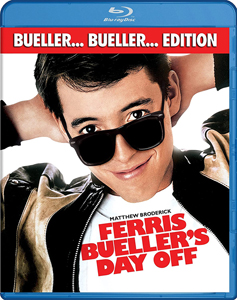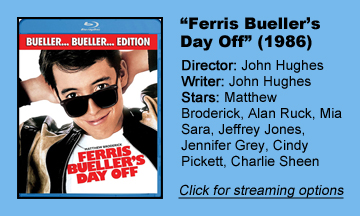“Ferris Bueller’s Day Off” (1986) – the fourth directorial effort from writer John Hughes – has two great messages that almost no one subscribes to in their daily lives: 1, stand up for yourself if you want to control your life, and 2, public school is horrible and should not continue to exist.
Yet the movie plays as a comedic fantasy more so than a guidebook. We’d like to be lucky enough to get away with everything like Ferris Bueller does – we’d like to live in the world of Yello’s “Oh Yeah” — but the bigger fantasy is that we’d even try any of these schemes in the first place.
Balanced Broderick
While the premise of three teens skipping school is safely in the zone of what Hughes’ fans will eat up, it’s harder to actually make “Bueller” a good movie. But somehow Ferris (Matthew Broderick, landing his career-defining role at age 24) comes off as endearing rather than arrogant and entitled – even though he talks directly to the viewer, like “Sixteen Candles’ ” Sam isn’t quite confident enough to do (she talks to herself at the end of scenes).
We eat out of Ferris’ hand through the whole Chicago-hopping adventure, just like girlfriend Sloane (Mia Sara) and bestie Cameron (Alan Ruck) do.
“Bueller” starts off with well-staged, barely satirical scenes proving Ferris’ thesis that high school is “childish and stupid.” Ben Stein teaches about a genuinely important topic – the economic and governmental causes for the Great Depression – but he’s so monotone that everyone is in a daze or outright sleeping.
Also, maybe this is a topic people are more suited to care about later in their lives. But public schools are rigid. I was once tasked with giving a brief presentation about my job, and this is indeed what a room of public high school students looks like; any interest in classroom-based learning has long since been eroded.
As it goes on, the movie veers into fantasy territory (How in the world does Ferris hack the school’s computer system before the internet existed?), but gradually enough to maintain our goodwill. Hughes always goes bigger and more elaborate with his party sequences, so we find Ferris lip-synching “Twist and Shout” on a float in a downtown Chicago parade.
Teaching by example
The title character doesn’t have an arc; rather, he is the teacher – and a good one, because he mostly teaches by example, even though he does have that fourth-wall-breaking monolog technique available to him. Ferris already knows all the tricks for faking sickness and not being caught outside his house – including tape-recorded hookups to the front-door speaker that would make Kevin McCallister envious.
Ferris must be self-taught. There’s never any sense that skipping school stunts his intellectual growth (indeed, he soaks up Chicago culture outside the classroom); the only danger is that the bureaucracy will punish him. The answer to Sloane’s question of what Ferris will do for a career is clearly “Whatever he wants to do.” Ferris is a winner at life.

Ferris’ students are the audience and other characters. Sloane, who also doesn’t have an arc, is his most doting disciple; they aim to marry, and there’s no reason to doubt they will. The loving Bueller parents remain oblivious to Ferris’ antics – so we never learn where they would stand if they found out about his trickery — but “Bueller” is otherwise all about watching people learn lessons.
Cameron realizes he needs to stand up to his (entirely off-screen) dad if he’s going to have a chance at happiness. Ferris’ sister Jeanie (Jennifer Grey) comes around to her brother’s way of thinking when she meets sexy jailbird Charlie Sheen (who is, appropriately, at the police station for “drugs”). Principal Rooney (Jeffrey Jones, adopting a wonderfully smarmy look) learns what a school bus smells like.
Expected comedy beats
When watching “Bueller,” we don’t immediately feel a need for Ferris or Sloane to learn anything, but I think the permanence of their roles – combined with some sequences running too long – makes the movie feel staler than it should. I also find that “Bueller” hits expected comedic beats rather than surprising us.
It needs the fast-paced and wild energy of a comedy, like “Weird Science,” but Hughes sometimes wants to get back to the brooding poignancy of “The Breakfast Club.” (Consider the sequence where the car gets destroyed and Cameron resolves to take the heat from his father. It feels so long.)
But that’s not quite possible when the main character’s journey goes from Point A back to Point A, and when another set of parents is so absurdly in the dark about their son’s school-skipping skills. Maybe the film would play better if Cameron was the POV character, soaking in Ferris’ outlook on life.
Whatever the reason, my appreciation for “Ferris Bueller’s Day Off” is mostly intellectual. It tackles an issue (the flaws of public schooling) that means a lot to me, and Broderick and his cast mates are on point, yet it doesn’t stir my passion as much as it should.
But I admit it could be that I’m jealous of how Ferris lives his life.


